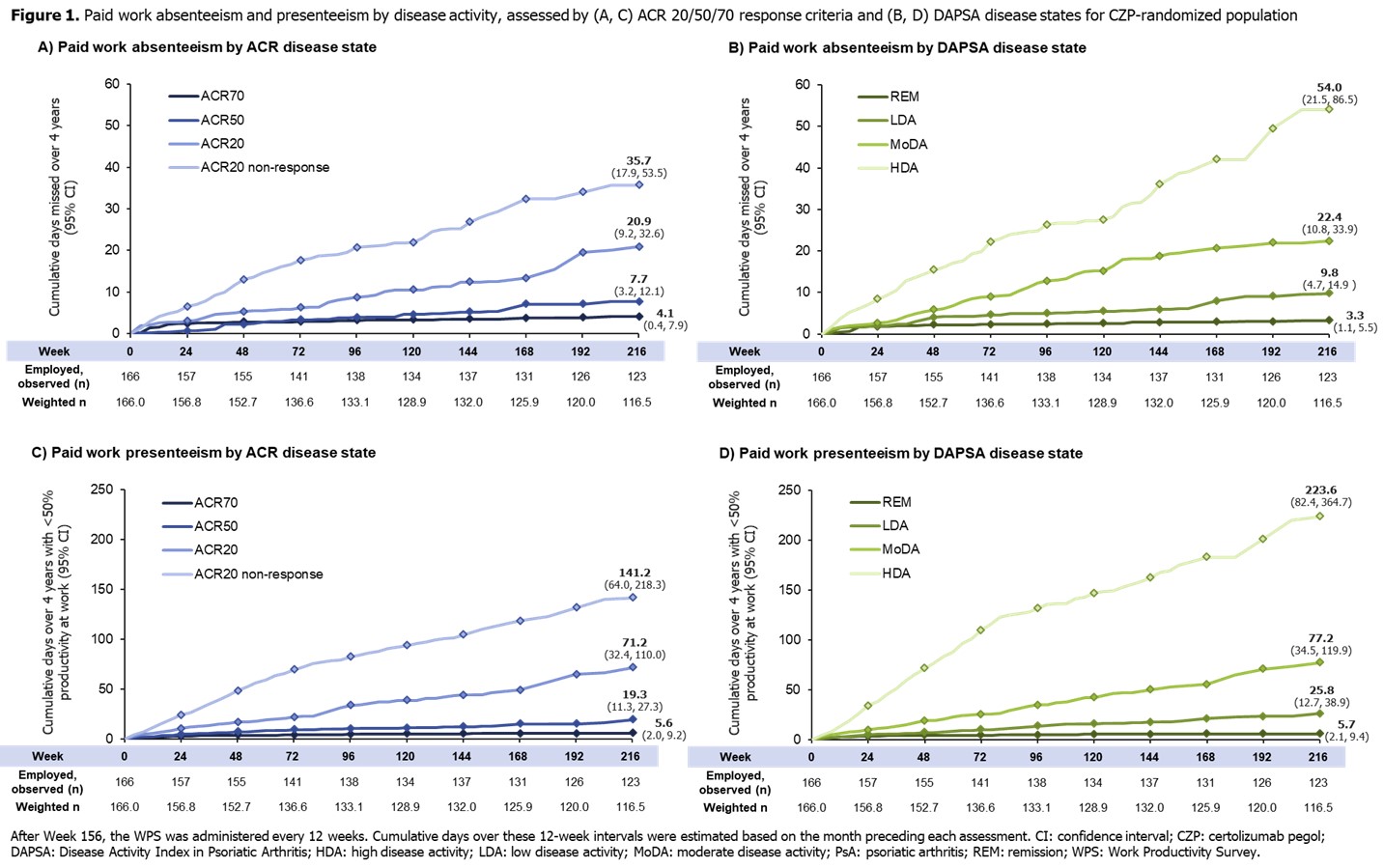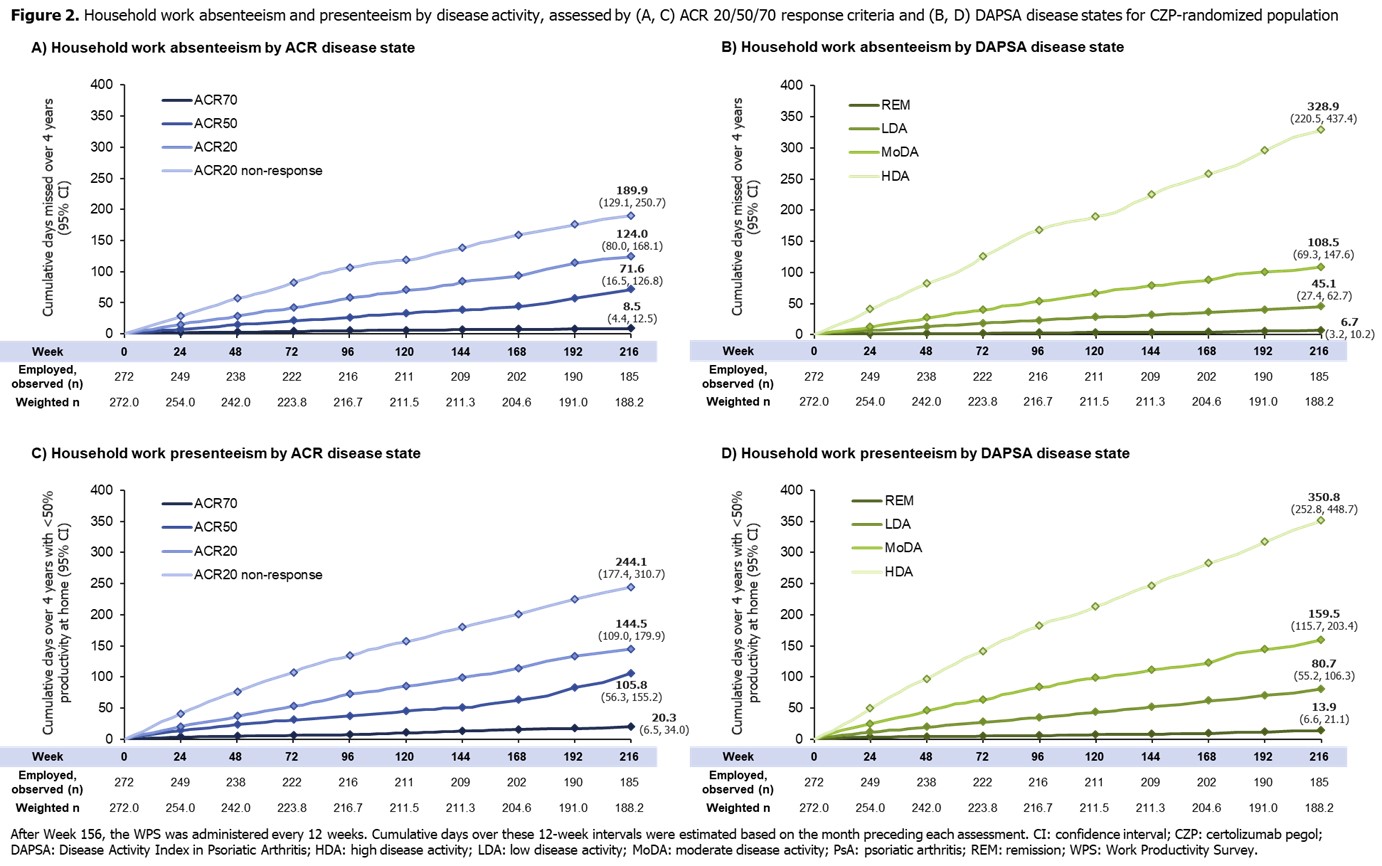Session Information
Date: Tuesday, November 9, 2021
Title: Spondyloarthritis Including PsA – Treatment Poster III: Psoriatic Arthritis II (1801–1835)
Session Type: Poster Session D
Session Time: 8:30AM-10:30AM
Background/Purpose: Psoriatic arthritis (PsA) is associated with a reduction in workplace productivity,1 which may extend into household productivity.2 Certolizumab pegol (CZP) is a tumor necrosis factor inhibitor, clinically effective at improving disease activity outcomes for patients (pts) with PsA.3 We have previously reported an association between stringent thresholds of disease control in pts with PsA, measured by ACR response criteria, and paid/household work productivity.4 However, it is also important to assess the relationship between disease activity and paid/household work productivity using a measure more relevant to real-world practice, such as Disease Activity Index in PsA (DAPSA).
Our purpose was to evaluate the association between DAPSA disease states and burden on paid/household work productivity in pts with PsA during long-term treatment with CZP.
Methods: These analyses used data from pts originally randomized to CZP in RAPID-PsA (NCT01087788), a 216-week phase 3 study.3 Pts were classified according to the ACR20/50/70 criteria and DAPSA disease states (high disease activity [HDA], moderate disease activity [MoDA], low disease activity [LDA] and remission [REM]). Paid/household work productivity, assessed with the arthritis-specific Work Productivity Survey, was compared for each threshold of disease control. An inverse probability weight model was used to account for predictors of dropout over 216 weeks. Cumulative days affected since study baseline were estimated using a weighted generalized estimating equations model.
Results: 273 pts were randomized to CZP, 183 (67.0%) of these pts completed Week 216. At baseline, 60.8% of pts were employed outside the home. Through Week 216, fewer days of paid work absence (absenteeism) were reported by pts achieving ACR70 (4.1 [95% confidence interval: 0.4, 7.9]), DAPSA REM (3.3 [1.1, 5.5]) and the intermediate measures, than ACR20 non-responders (35.7 [17.9, 53.5]) and those with DAPSA HDA (54.0 [21.5, 86.5]; Figure 1A, B). These findings extended to household work absenteeism; again pts achieving ACR70 (8.5 [4.4, 12.5]) and DAPSA REM (6.7 [3.2, 10.2]) reported fewer absences than ACR20 non-responders (189.9 [129.1, 250.7] and those with DAPSA HDA (328.9 [220.5, 437.4]; Figure 2A, B).
Improved ACR and DAPSA outcomes also correlated with larger reductions in the number of days with < 50% productivity at work/home (presenteeism; Figure 1C, D & Figure 2C, D), compared with absenteeism.
Conclusion: Cumulative estimates of the number of work days affected by PsA, as correlated with DAPSA status, support earlier findings4 that achievement of more stringent thresholds of disease control are associated with reduced burden on paid/household work productivity.
References: 1. Kennedy M. Clin Exp Rheumatol 2014;32:342–8; 2. Osterhaus JT. Arthritis Res Ther 2014;16:R164; 3. van der Heijde D. RMD Open 2018;4:e000582; 4. Tillett W. Value Health 2020;23:S411.
To cite this abstract in AMA style:
Tillett W, Coates L, Kiri S, Taieb V, Mease P. Reduced Burden on Paid and Household Work Productivity with Stringent Thresholds of Disease Control: Further Results from Long-Term Certolizumab Pegol Treatment in Patients with Psoriatic Arthritis [abstract]. Arthritis Rheumatol. 2021; 73 (suppl 9). https://acrabstracts.org/abstract/reduced-burden-on-paid-and-household-work-productivity-with-stringent-thresholds-of-disease-control-further-results-from-long-term-certolizumab-pegol-treatment-in-patients-with-psoriatic-arthritis/. Accessed .« Back to ACR Convergence 2021
ACR Meeting Abstracts - https://acrabstracts.org/abstract/reduced-burden-on-paid-and-household-work-productivity-with-stringent-thresholds-of-disease-control-further-results-from-long-term-certolizumab-pegol-treatment-in-patients-with-psoriatic-arthritis/


